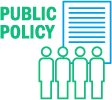DETAILS:
- Date : 27 Oct 2018 (Saturday)
- Time : 2:30 pm – 5:30 pm
- Venue : 2/F, classrooms 2302 / 2303 / 2304 / 2306 (Lift 17/18), HKUST

 WORKSHOP 1 – Climate “Extremes”
WORKSHOP 1 – Climate “Extremes”
| WATCH VIDEO | As global warming accelerates, the extreme weather events emerge as one of the most prominent global risks. This workshop offers an opportunity for scientists to share their work and to explore how climate science can collaborate with the government, business and community sectors in climate adaptation and resilience, especially regarding the challenges to public health and urban and environmental planning posed by heat waves and drought.
Session 1.1: Climate Change and Adaptation: General Perspective
We will discuss the science of climate extremes and the status of climate prediction and examine the observational evidence of changing climate extremes. What are the resulting threats to urban sustainability and desirable pathways for future urban development will also be addressed in this session.
Moderator: Otto POON, ATAL
Speakers:
- Ruby LEUNG, Pacific Northwest National Laboratory, Brasilia University (Topic: Observational evidence of extremes)
- LEE Sai-ming, Hong Kong Observatory, HKSAR Government (Topic: Extreme Rainfalls and Tropical Cyclones in Hong Kong)
- Winston CHOW, National University of Singapore (Topic: Climate change impact and vulnerability
Session 1.2: Extreme Heat Waves and Public Health
This session presents the trends and distribution of heat waves and discuss the relation between urbanization, human population and heat stress. We will also discuss the impact of increasing heat weaves to ecosystem and public health.
Moderator: Xiaoming SHI, HKUST
Speakers:
- Gabriel LAU, Chinese University of Hong Kong (Topic: Heat Waves in South China)
- Eun-Soon IM, HKUST (Topic: Ubiquitous Occurrence of Deadly Heat Waves under Global Warming)
- Alson WM CHAN, Hong Kong Academy of Medicine (Topic: The Effect of Global Warming on Biodiversity and Human Health)
![]()
 WORKSHOP 2 – Excess Water Challenges
WORKSHOP 2 – Excess Water Challenges
| WATCH VIDEO | Increasingly extreme and frequent rainfall events due to the changing climate mean that our natural and man-made slopes will be subjected to continuous threats of instability and debris flow. This part of the workshop will explore and discuss new and advanced knowledge that could help us better understand the physical characteristics and underlying mechanisms of different types of debris flow and how the new understanding could inform more quantitative risk-based assessments and managements.
Session 2.1: Excess Water Challenges – impact on landslides
Moderator: Anthony Leung, HKUST
Speakers:
- Carlos LIMA, Brasilia University (Topic: Extreme Rainfalls in a Changing World)
- TSZ Cheung Lee, Hong Kong Observatory, HKSAR Government (Topic: Extreme Rainfalls and Tropical Cyclones in Hong Kong)
- Julian KWAN, Drainage Services Department, HKSAR Government (Topic: Strengthening Resilience against Landslide Hazard under Extreme Weather)
- Raymond WOON, Civil Engineering and Development Department, HKSAR Government (Topic: Flooding Challenge and Blue Green Infrastructure for Combating Climate Change in Hong Kong)
![]()
 WORKSHOP 3 – Ocean-related Challenges
WORKSHOP 3 – Ocean-related Challenges
| WATCH VIDEO | Sea level rise and related incidents including storm surge and coastal floods have been threatening lives and coastal infrastructures in the past few decades. Previous studies even indicated an expecting 75-cm sea level rise by 2100 in the Pearl River Delta region would be leading to estimated deaths and replacements in around 200 and 1.5 million, respectively. With increasing extreme weather challenges happening in recent years, this is definitely a timely discussion for Hong Kong and the whole PRD region to consider and address all these issues.
Session 3.1: Managing Sea Level Rise
Moderator: Peter LOUIE, Environmental Protection Department, HKSAR Government
Speakers:
- Xuebin ZHANG, CSIRO (Topic: Sea-level Rise: Global and Regional)
- Sai-tick CHAN, Hong Kong Observatory, HKSAR Government (Topic: Tropical Cyclones, Storm Surges and Sea Level Rise)
- Alexis LAU, HKUST (Topic: Sea-level Rise Damage Projection, Risk Vulnerability and Resilience)
![]()
 WORKSHOP 4 – Tertiary Climate Impacts & Public Policy
WORKSHOP 4 – Tertiary Climate Impacts & Public Policy
| WATCH VIDEO | Every city and region must consider what more needs to be done to meet the challenge of extreme weather. The recent super typhoon, ‘Mangkhut’, also gave Hong Kong and South China a chance to reflect on new issues going forward where public-private sectors collaboration will be key to adaptation and building greater resilience. This workshop will focus on a range of policy-relevant discussions not being explored by the other workshops.
Session 4.1: Securing Basic Needs (Energy-Water-Food) against Climate Change Impacts
Moderator: Christine LOH, HKUST
Speakers:
- Bruce CHONG, ARUP (Topic: Energy-Food-Water Security Challenge: A Policy Perspective)
- Deepak SHARMA, UTS (Topic: Energy-Food-Water Security Challenge: A Policy Perspective)
- Daniel KREEGER, ACCO (Topic: Human Capital, Organizational Transformation & Systems Thinking)
- Andy LIPKIS, TreePeople (Topic: Multi-Agency Collaborations to Accelerate Climate Adaption and Resilience)
![]()